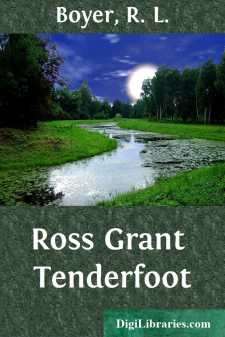Categories
- Antiques & Collectibles 13
- Architecture 36
- Art 48
- Bibles 22
- Biography & Autobiography 813
- Body, Mind & Spirit 142
- Business & Economics 28
- Children's Books 17
- Children's Fiction 14
- Computers 4
- Cooking 94
- Crafts & Hobbies 4
- Drama 346
- Education 46
- Family & Relationships 57
- Fiction 11829
- Games 19
- Gardening 17
- Health & Fitness 34
- History 1377
- House & Home 1
- Humor 147
- Juvenile Fiction 1873
- Juvenile Nonfiction 202
- Language Arts & Disciplines 88
- Law 16
- Literary Collections 686
- Literary Criticism 179
- Mathematics 13
- Medical 41
- Music 40
- Nature 179
- Non-Classifiable 1768
- Performing Arts 7
- Periodicals 1453
- Philosophy 64
- Photography 2
- Poetry 896
- Political Science 203
- Psychology 42
- Reference 154
- Religion 513
- Science 126
- Self-Help 84
- Social Science 81
- Sports & Recreation 34
- Study Aids 3
- Technology & Engineering 59
- Transportation 23
- Travel 463
- True Crime 29
Ross Grant Tenderfoot
by: R. L. Boyer
Description:
Excerpt
CHAPTER I
A BORN SURGEON
Dr. Fred Grant, recalled in haste from his daily round of professional visits by a telephone message from his nephew, leaped out of his carriage over the yet moving wheel, and, stuffing an open letter into his pocket, rushed up the walk and into his office, which occupied a wing of his commodious house.
A sight met his eyes which was not uncommon, situated as he was in the midst of the coal fields of Wyoming Valley in Pennsylvania. Stretched out on the leather couch lay a man from the mines, black and grimy, his right arm crushed. Two other miners, also blackened with coal-dust, sat on the edges of their chairs, their eyes following the movements of Ross Grant, the doctor’s nephew and self-constituted assistant.
Those movements had been rapid and effective. Again and again had this seventeen-year-old boy been brought face to face with such cases as this, and he handled it promptly and wordlessly. Words, indeed, would have been wasted, as none of his callers spoke English. He had quieted the sufferer with a hypodermic injection of morphine, stripped the injured arm, cleansed it, and treated it with a temporary dressing.
Then, with the bandages firmly in place, he had gone to the telephone and patiently called up house after house until he found his uncle.
When Dr. Grant entered the office, he found Ross calmly taking the temperature of the wounded man.
"He must have met with the accident at least an hour before they got him here," the boy explained, "for he was suffering awfully. I thought I ought to fix him up before trying to find you."
His uncle nodded with satisfaction, and bent over the man. "All right," he commended briefly, but his tone said more. Words were not always necessary to an understanding between uncle and nephew.
The younger man was an abridged edition of the older in form and feature. In movements the two were alike only so long as Ross was aiding the doctor on such an occasion as this. Then there were in both the same alertness and quiet intentness, the same compression of the lips and narrowing of the eyes. But when the strain of the hour was past and the miners gone, the boy’s manner changed. The alert quality which characterized the uncle at all times seemed to desert the nephew, and his movements became slow. From the born surgeon in embryo he became a rather awkward, self-conscious boy.
Throwing himself into a chair behind the table, he drew toward him Gray’s "Anatomy," and began reading at a line marked by a paper-cutter, his closely cropped head grasped in both hands.
The older man moved around the room restlessly, occasionally glancing with troubled eyes at the figure behind the table. Standing finally in front of the window, he drew the letter from his pocket, smoothed it out, and read it again.
In front of him, in the valley, lay Pittston and Wilkes-Barre, with Scranton in the distance, and beyond, the sun-burned hills, almost hidden now by the smoke from a hundred coal-breakers, and by the late August haze.
"Ross," began Dr. Grant abruptly, without turning, "I’m afraid you are going to meet disappointment–to a certain extent. I have a letter from your father."
The boy raised his head with a jerk. "Do you mean that he forbids––"
"No,"–the doctor turned slowly,–"not exactly. He expects to send for you in a few days, and will tell you himself."
Ross’s chin came up. "And I shall not be twenty-one for nearly four years yet!" he exclaimed aggressively.
His uncle looked at him with more sternness than he felt. "Remember, Ross, that he is your father and that you owe him––"
Ross interrupted hotly, looking longingly at the letter. "I don’t owe him as much as I do you and Aunt Anne."
Dr. Grant made no reply, nor did he share the letter. Putting it into an inner pocket, he left the office, and presently Ross heard the sound of wheels on the drive. Dr. Grant was starting again on his interrupted round of calls....


